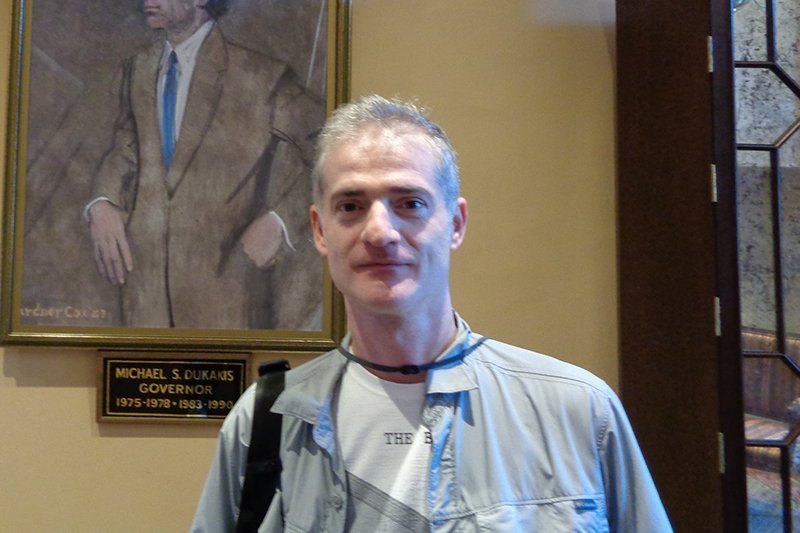Border Changes Create More Issues Than They Solve
In face of the diametrical opposite stances of North Macedonia and Bulgaria with regard to their respective identity narrative it seems that little room for optimism has been left that the differences could be actually bridged between the two countries.
This comment was made by Dr. Yorgos Christidis, Associate Professor at the University of Macedonia in Thessaloniki, in an exclusive interview with Albanian Daily News at a sensitive moment for Skopje in its further drive to take forward its integration process towards the European Union.
Asked if Albania should wait for the resolution to the North Macedonian-Bulgarian dispute to start the first intergovernmental session with the EU, the Greek Professor was of the opinion that unfortunately for Albania, the current stalemate on North Macedonia’s accession process is bad news also for it. “And although, the EU Commissioner for Neighborhood and Enlargement, Oliver Varhelyi, suggested the “decoupling†as a way forward, it has become clear that his suggestion is lacking political support: Germany and Austria, two states that exercise a significant influence upon the formation of EU policy in the Western Balkans, have rejected it.â€
In a comment on the April 25 elections in Albania, Dr. Christidis, who is also research fellow at the Hellenic Foundation for European and Security Policy (ELIAMEP) and ENC Academic Council member, was of the opinion that despite the legitimate criticism, there is measurable progress concerning democratic standards in Albania and elsewhere. “The Albanian government should intensify its reform efforts; for example, it should complete judicial reforms.â€
Speaking of the current state of the relations between Albania and Greece, the Professor thinks that it is forgotten that there are more things that unite the two countries than those that separate them. “Above all the common European home (the EU) where Albania also belongs. All main political forces in Greece appear to understand that and are supportive of Albania’s EU aspirations,†Dr. Christidis said.
“Too little, too late!†With these words he summarized the EU’s attitude on the issue of vaccine’ deliveries to the Western Balkans until today. “Given the difficulties of the EU accession process, and the questions of EU credibility it has generated, the European Commission and member-states should have paid more attention to issues like the one of vaccine’ deliveries to the Western Balkans.â€
“The Western Balkans are the “soft-underbelly†of the EU. The EU has every reason to integrate the states of the region into its structures and not to allow the region to drift away. The future of the region belongs to the EU!†said Dr. Yorgos Christidis, Associate Professor at the University of Macedonia in Thessaloniki, in the following interview:
Albanian Daily News: Professor, which is, according to your assessments, the stage set for the future relations between North Macedonia and Bulgaria, and which are the true reasons behind this aggravation of the relationship between them? Does this influence the general situation in the region which even without them is still relentless?
Dr. Yorgos Christidis: Unfortunately, North Macedonian - Bulgarian relations are at an exceedingly difficult juncture, with no easy way forward. As it is well known since October 2019, Sofia has conditioned its support to the opening of the EU’s accession negotiations for North Macedonia, upon the previous satisfaction of several preconditions relating to the implementation of the August 2017 Treaty between the two countries and, in addition, to issues relating to the identity narrative of the Makedontsi.
However, Skopje’s view on those issues is at present diametrically opposed to that of Sofia (in Skopje they are talking about their own “red linesâ€), leaving little room for optimism that the differences could be actually bridged.
- As a shrewd connoisseur of the relationship between those two countries do you think the authorities will find a solution not letting things drag regarding the Bulgarian veto to the opening of the EU accession talks of North Macedonia as it happened with the situation with Greece on the name issue?
-The current caretaker government in Bulgaria, formed following the 4th of April parliamentary elections in the country and the failure to reach an agreement on the formation of a new government, has made it clear that it lacks political legitimacy to change national policy on the issue. In other words, it is highly unlikely that international pressure upon Sofia could produce any time soon a change in its position relating to the opening of North Macedonia’s accession negotiations. The fate of the latest Portuguese initiative on the issue underlined that in a clear manner. We will probably have to wait until after the 11th of July elections in Bulgaria and the formation of the next government.
- And as we are talking about the EU accession process, Dr. Christidis do you think that the ‘decoupling’ should go which means that Albania should wait for the resolution to the North Macedonian-Bulgarian dispute to start the first intergovernmental session with the EU?
- Unfortunately for Albania, the current stalemate on North Macedonia’s accession process is bad news also for it. And although, the EU Commissioner for Neighborhood and Enlargement, Oliver Varhelyi, suggested the “decoupling†as a way forward, it has become clear that his suggestion is lacking political support: Germany and Austria, two states that exercise a significant influence upon the formation of EU policy in the Western Balkans, have rejected it.
- Dr. Christidis, it’s past the dilemma over the result of the parliamentary elections in Albania, and now as time passes by despite irregularities the results of the elections have been considered acceptable by the international community although the opposition complains against the victory of Socialists. There were also elections in other Western Balkan countries, some polls are pending in certain countries. What is your point of view regarding standards, and I mean such standards which can be a plus for their EU integration process?
- One should see the democratization process in the Western Balkans as a difficult, long-term process, encountering many difficulties, relating both to the legacy of the past and to the behavior of the political elites in the region that quite often manipulate those issues for their own interests.
Albania is no exception in that respect. There are still issues, for example relating to the organization of elections. Certainly, those will have to be addressed satisfactorily by the government, otherwise tension with the opposition, as well as criticism against Albania abroad will continue, having a negative effect upon its European aspirations. At the same time, and despite the legitimate criticism, there is measurable progress concerning democratic standards in Albania and elsewhere. The Albanian government should intensify its reform efforts; for example, it should complete judicial reforms.
-In the meantime, as a follower of the course of the Albanian-Greek relations which are your expectations after these elections of the turn because as it is already known there are some pending unresolved issues between the two countries?
-Well, the expectation is that where there has been already an initial agreement - as for example on the issue of the delimitation of their sea borders - the two sides should move forward. I would like to remind you that last year the two sides agreed in principle to submit this case to international justice. Where possible, Athens and Tirana should resolve their differences. We forget that there are more things that unite the two countries than those that separate them. Above all the common European home (the EU) where Albania also belongs. All main political forces in Greece appear to understand that and are supportive of Albania’s EU aspirations.
- Besides the fatigue of the WB countries being kept in the ‘EU waiting room’, concrete evidence of the waning patience was the vaccine issue. Facts are stubbornly showing that following Serbia’s example, more and more regional countries are starting to rely on direct negotiations with producers and supply contracts with China and Russia. According to you, are these reasons for the diminishing of confidence of WB countries in the EU?
-Unfortunately, you are right. If the pace of the EU accession process has run into considerable difficulties, because in many cases of the complexity of the issues involved, in the case of vaccine’ deliveries, the EU could certainly have done a better job! It was just at the end of April that the European Commission together with Austria announced the delivery of 651,000 doses, with tranches beginning in May and continuing until August.
The EU's attitude on the issue of vaccine’ deliveries to the Western Balkans until today could be summarized as “too little, too lateâ€. Given the difficulties of the EU accession process, and the questions of EU credibility it has generated, the European Commission and member-states should have paid more attention to issues like the one of vaccine’ deliveries to the Western Balkans.
- According to your opinion, should the accession process with the Western Balkans countries be one of the priority items of the Conference on the Future of Europe? There has been an intensive diplomatic activity with Greece, Slovenia and Croatia, EU member countries, as promoters of interesting events over the last weeks with focus on the integration process of the Western Balkans in the Union.
- As you know, the Conference on the Future of Europe is an initiative announced in 2019, concerning the future of the European Union and the issue of necessary reforms on a variety of topics, from “climate change and the environment†to “EU’s position in the Worldâ€. The interesting element with this initiative is that it has established a public forum, allowing EU citizens to express their views about the future of Europe. In other words, all issues are open for discussion, including EU’s enlargement policies.
- Do you think that the importance of borders between the regional countries will decrease in the context of the hopeful future accession of them in the Union, or that will remain a pending issue keeping the region in limbo? I don't want to give it any nuance of conspiracy but the question on the much talked about scheme of border changes in the Western Balkans goes on despite the existence or not of a 'non paper'. The issues created tensions even in the Summit of Brdo-Brijuni process in Slovenia.
- Any talk of border changes in the Western Balkans creates more issues than it solves. Does anyone seriously think that the solution to the problems of a dysfunctional Constitution in Bosnia-Herzegovina is the abolition of the state? And how exactly will that happen without the consensus of the Bosniaks (Bosnian Muslims)? Or what about the implications on North Macedonia of a unification between Kosovo and Albania? Is NATO ready or willing to deal with the potential consequences of such a development on the territorial cohesion of one of its member-states?
Any talk of sweeping border changes in the Western Balkans has meaning only in the context of increasing the pressure upon the international community, and in particular upon the European Union, to increase its involvement in the region by assisting with all the necessary changes that have to take place: for example, on reforming Bosnia-Herzegovina’s Constitution.
- To conclude, Dr. Christidis, much is spoken of the Western Balkans in the geostrategic power game. As a seasoned researcher in this field how do you see the prognosis in the post pandemic era when the common thought is gaining ground that there will be a reshaping of the global power balance worldwide?
- The Western Balkans are the “soft-underbelly†of the EU. The EU has every reason to integrate the states of the region into its structures and not to allow the region to drift away. The future of the region belongs to the EU!














